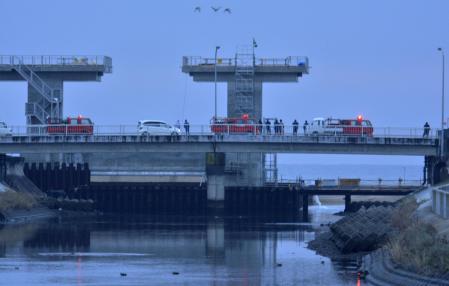
By Yuka Obayashi and William Mallard
TOKYO (Reuters) – A powerful earthquake rocked northern Japan early on Tuesday, briefly disrupting cooling functions at a nuclear plant and generating a small tsunami that hit the same Fukushima region devastated by a 2011 quake, tsunami and nuclear disaster.
The magnitude 7.4 earthquake, which was felt in Tokyo, sent thousands of residents fleeing for higher ground as dawn broke along the northeastern coast.
There were no reports of deaths or serious injuries several hours after the quake hit at 5:59 a.m. (2059 GMT Monday). It was centred off the coast of Fukushima prefecture at a depth of about 10 kilometres (6 miles), the Japan Meteorological Agency (JMA) said.
A wave of up to 1.4 metres (4.5 ft) high was recorded at Sendai, about 70 km (45 miles) north of Fukushima, with smaller waves hitting ports elsewhere along the coast, public broadcaster NHK said.
Television footage showed ships moving out to sea from harbours as tsunami warnings wailed after alerts of waves of up to 3 metres (10 feet) were issued.
“We saw high waves but nothing that went over the tidal barriers,” a man in the city of Iwaki told NTV television network.
Aerial footage showed tsunami waves flowing up rivers in some areas, and some fishing boats were overturned in the port of Higashi-Matsushima.
The Pacific Tsunami Warning Center in Hawaii said the tsunami threat had now largely passed and the JMA later lifted its warnings.
The U.S. Geological Survey measured Tuesday’s quake at magnitude 6.9, down from an initial 7.3.
All Japan’s nuclear power plants on the coast threatened by the tsunami have been shut down in the wake of the March 2011 disaster, which knocked out cooling systems at Tokyo Electric Power Co’s Fukushima Daiichi nuclear plant, causing reactors to melt down and spew radiation into the air, soil and sea.
The cooling system for a storage pool for spent nuclear fuel at the reactor at its Fukushima Daini Plant was initially halted on Tuesday, said a spokeswoman for Tokyo Electric Power, known as Tepco, but was restarted soon after.
No other damage from the quake has been confirmed at any of its power plants, although there have been blackouts in some areas, the spokeswoman said.
Only two reactors are operating in Japan, both in the southwest. Even when in shutdown, nuclear plants need cooling systems operating to keep spent fuel cool.
Tohoku Electric Power Co said there was no damage to its Onagawa nuclear plant, while the Kyodo news agency reported there were no irregularities at the Tokai Daini nuclear plant in Ibaraki prefecture.
COAST EVACUATED
Japanese Minister for Disaster Management Jun Matsumoto told reporters about three hours after the quake that there had been no reports of significant injuries so far. One woman suffered cuts to her head from falling dishes, Kyodo news agency reported, citing fire department officials.
NHK showed footage of residents of Ishinomaki, a city badly hit in 2011, standing on a hill dressed in hats and heavy coats, staring down at the ocean.
Earthquakes are common in Japan, one of the world’s most seismically active areas. Japan accounts for about 20 percent of the world’s earthquakes of magnitude 6 or greater. (For a graphic, click: tmsnrt.rs/2fMm2pk)
The March 11, 2011, quake was magnitude 9, the strongest quake ever recorded in Japan. The massive tsunami it generated knocked out the Fukushima Daiichi plant, causing the worst nuclear crisis since Chernobyl a quarter of a century earlier.
Warning systems have been updated since the 2011 disaster to spread warnings more quickly to the affected population, said Tsunetaka Omine, head of the Disaster Management Division in Iwaki, a city in Fukushima prefecture.
Previously, warnings were broadcast on outdoor loudspeakers and by sending firefighters around communities, he said. Authorities now send tsunami warnings to every mobile phone in the area and broadcast on local radio.
Previously, there were also complicated directions on where to evacuate. “But now, we basically just tell people to head away from the sea, to the highest possible ground,” Omine said.
Nissan Motor Co said it would suspend work at its engine factory in Fukushima at least until the latest tsunami warning was lifted. A spokesman said there were no injuries or damage at the plant, which was badly damaged in the 2011 disaster.
Toyota Motor Corp said all its factories in northeastern Japan were operating as usual.
An Iwaki city fire department official said there was smoke or fire at Kureha’s research centre in a petrochemical complex in Iwaki city minutes after the quake but it was extinguished soon after.
Japan’s famous Shinkansen bullet trains were halted along one stretch of track and some other train lines were also stopped.
Japanese financial markets were little affected, with Nikkei futures recovering after a brief fall and the yen up a touch against the U.S. dollar, although still near a five-month low hit earlier in the session.
(Additional reporting by Chris Gallagher, Jon Herskovitz, Osamu Tsukimori, Aaron Sheldrick and Elaine Lies; Writing by Lincoln Feast; Editing Paul Tait)
THE ROTTEN FISH: CAN OF WORMS OPENED OF APC & TINUBU'S GOVERNMENT OVER NIGERIA'S ECONOMIC DOWNTURN
WATCH THE CRITICAL ANALYSIS AND KNOW THE RESPONSIBLE PARTIES TO BLAME FOR NIGERIA'S ECONOMIC CHALLENGES, WHILE CITIZENS ENDURE SEVERE HARDSHIPS.Watch this episode of ISSUES IN THE NEWS on 9News Nigeria featuring Peter Obi's Special Adviser, Dr Katch Ononuju, 9News Nigeria Publisher, Obinna Ejianya and Tinubu Support Group Leader, McHezekiah Eherechi
The economic crisis and hardship in Nigeria are parts of the discussion.
Watch, leave your comments, and share to create more awareness on this issue.
#9NewsNigeria #Nigeria #issuesInTheNews #politics #tinubu THE ROTTEN FISH: CAN OF WORMS OPENED ...
DON'T FORGET TO SUBSCRIBE AND LEAVE YOUR COMMENTS FOR SUBSEQUENT UPDATES
#9newsnigeria #economia #economy #nigeria #government @9newsng
www.9newsng.com
